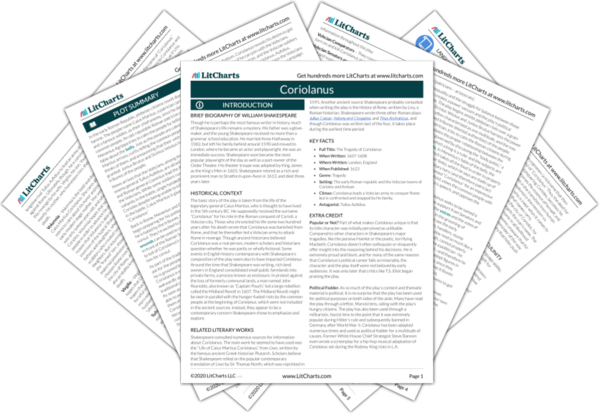Summary
Analysis
At a camp near Rome, Aufidius talks with his Volscian Lieutenant, asking whether the soldiers are still liking Coriolanus. The lieutenant doesn’t understand what “witchcraft” is in Coriolanus, but all the Volscian soldiers are completely obsessed with him, even more than they are with Aufidius. Aufidius says he can’t help this without undermining their current campaign, noting that Coriolanus has a prouder bearing than he suspected when they first embraced. At the same time, he recognizes that Coriolanus is constant, and so he excuses what Coriolanus cannot change.
The lieutenant thinks that Coriolanus’ popularity is witchcraft, possibly because the Roman is not well spoken, but also because he has slayed so many Volscians. Aufidius is practical, and he knows that he has to wait to compete with Coriolanus until they have captured the city. He at once acknowledges Coriolanus’ firm nobility and accuses him of being slightly prideful, suggesting that there might be some truth both Coriolanus’ claim to honor and the tributes’ claim that he fights for pride.
Themes
Literary Devices
The Volscian Lieutenant thinks it would have been in Aufidius’s better interest not to join with Coriolanus and to attack Rome on his own, or else to leave the battle entirely up to Coriolanus. Aufidius sees what the lieutenant means, but he assures him that though Coriolanus seems to be fully committed to the Volscian cause, and though he “fights dragonlike” and is extremely successful in battle, Aufidius can still accuse Coriolanus, and he plans a bloody reckoning.
Again Coriolanus is characterized as a dragon, a powerful, solitary creature. Since Aufidius has failed in hand to hand combat so many times, he is now using subtle (political) tactics to defeat Coriolanus.
Themes
The Volscian Lieutenant asks Aufidius if he thinks Coriolanus will capture Rome, and Aufidius responds that everyone yields to Coriolanus. He has the nobility of Rome on his side, the tribunes cannot fight, and the people will most likely repeal Coriolanus’s banishment just as swiftly as they enacted it. Aufidius thinks Coriolanus will take Rome “by sovereignty of nature.”
Aufidius also recognizes how fickle the Roman people are. His comment that Coriolanus will take Rome “by sovereignty of nature” suggests an elitism akin to that of Coriolanus, where the higher classes are simply given control by the natural order of things.
Themes
Aufidius continues: Coriolanus was a noble servant, but could not hold on to his honors either due to pride, poor judgment, or his constant, unchanging nature. For a little of each of these reasons he was feared, hated, and eventually banished. But Coriolanus is noble enough to prevent people from talking about his faults, and the interpretation of one’s virtues is up to one’s contemporaries. There is no greater memorial for power, Aufidius says, than a public platform. When Coriolanus wins Rome, Aufidius plans to win against him shortly after.
Aufidius is slightly outmatched on the battlefield by Coriolanus, but he greatly overmatches his Roman rival in the political sphere. He’s able to perfectly recapitulate why Coriolanus was banished, but he also recognizes the value of nobility. And while Coriolanus believes the battlefield is the end-all, be-all of power, Aufidius believes that a public (political) platform is where true power lies.
Themes
Get the entire Coriolanus LitChart as a printable PDF.













